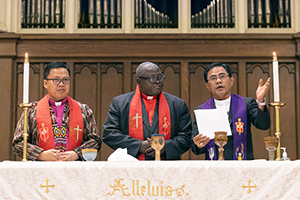After resting on Sunday, General Conference delegates hit the ground running in the legislative assembly’s second week. But as news spread of a mass shooting in Charlotte, just a few miles from where General Conference is taking place, a hectic plenary session was paused as delegates prayed for victims and the community.
Church in Africa gets 2 more bishops, new map
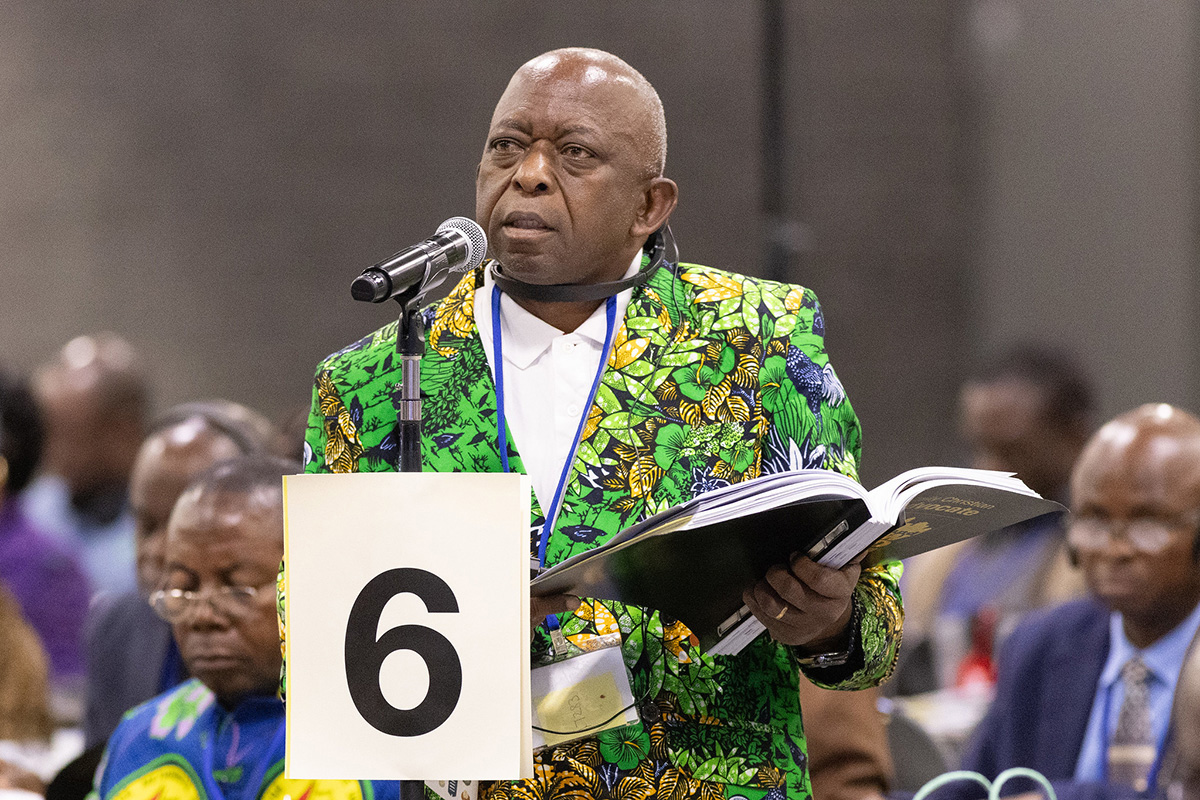
The United Methodist Church in Africa is getting two additional bishops, but not the five originally planned by the 2016 General Conference.
Delegates voted 645-96 to add the two African bishops, increasing their number from 13 to 15. They also voted 692-43 to adjust the boundaries of the three central conferences on the continent; starting in 2025, there will be four.
But debate — especially over the number of bishops to add — took up much of the day both before and after lunch, with many delegates expressing frustration that the number was below the five bishops initially sought.
Delegates passed two amendments to that legislation, including one aimed at speeding up the addition of more episcopal leaders in the denomination’s fastest-growing region.
Delegates pray after Charlotte shootings

As news spread of deadly shootings of law enforcement officers in Charlotte, General Conference delegates paused to pray for victims and the community.
The Charlotte-Mecklenburg Police Department reported late on April 29 that three members of a multi-agency U.S. Marshals Fugitive Task Force were killed after trying to serve a warrant for possession of a firearm by a convicted felon. Five other officers were wounded; one remains in critical condition. A suspect in the incident also was killed.
The shootings occurred about seven miles east of the Charlotte Convention Center, where General Conference is underway through May 3.
North Carolina Conference Bishop Connie Shelton led General Conference delegates in prayer for several minutes after news organizations began to share sketchy details of the unfolding tragedy. Bishop Ken Carter, who leads the Charlotte Episcopal Area, issued a statement praying “for all who are in the midst of this tragic violence.”
Deaconesses, home missioners consecrated
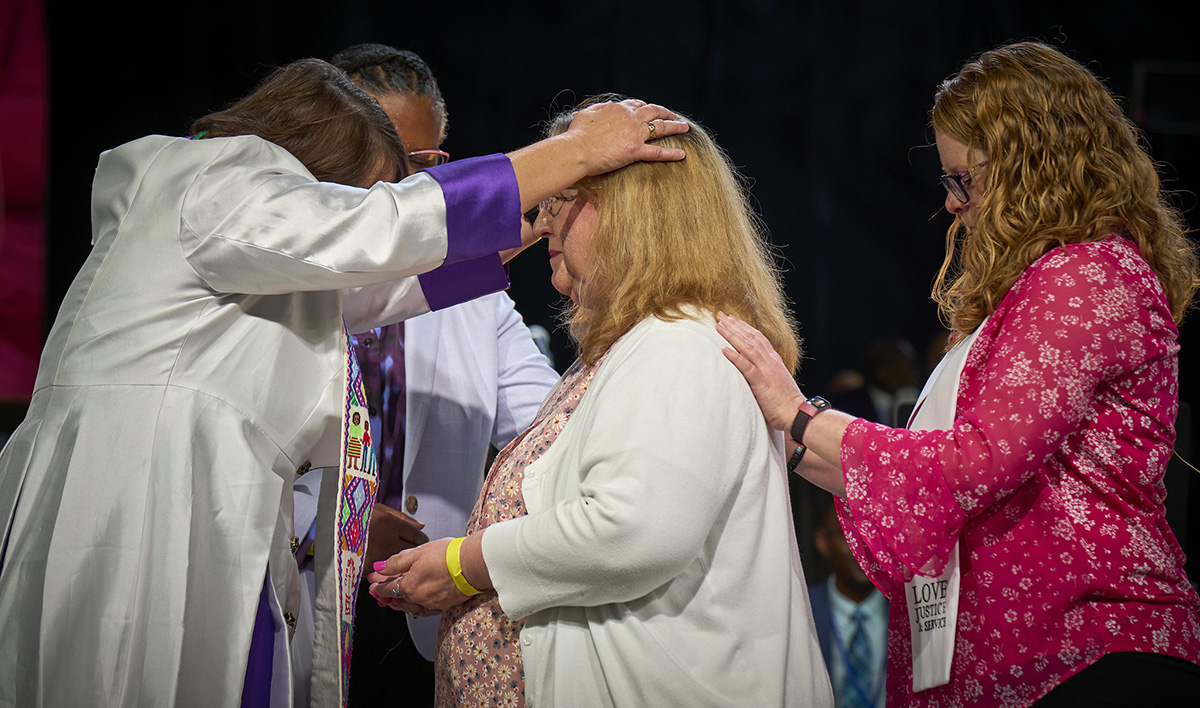
During April 29 morning worship at General Conference, bishops consecrated 26 laypersons, including three central conference members, to a lifetime of service as deaconesses and home missioners.
Preaching at the service, Mountain Sky Area Bishop Karen Oliveto gave thanks for their commitment and called on those in attendance to look to the order’s history of serving the marginalized.
Deaconess Megan Hale, United Women in Faith executive for the Office of Deaconess and Home Missioner, said, “Wherever they serve and regardless of the task, deaconesses and home missioners find and represent the presence of God in the midst of those with whom they serve.”
Prior to the consecration, Oliveto’s sermon called on those in attendance to make God’s love visible in all they do and embody the fullness of God’s love with justice and mercy.
“Jesus makes it plain that we are to receive one another, treat one another, serve one another, love one another as if we are serving him,” she said. “We need to see Imago Dei, the image of God, in each person — not just in the people who look like us, who talk like us, who think like us, who love like us, who believe like us.”
Apology OK’d for church role in Hawaiian history
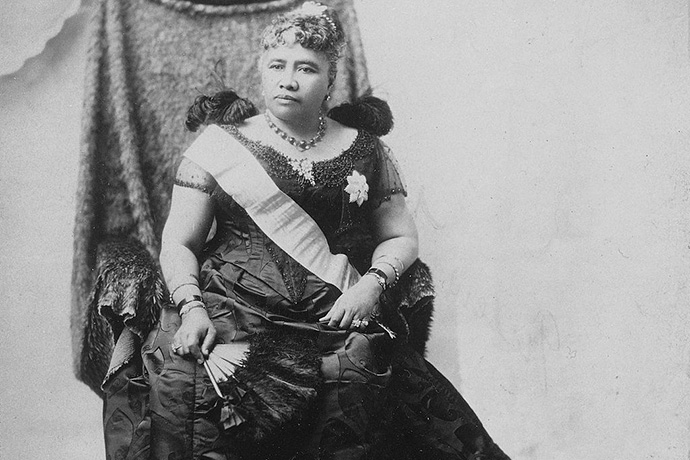
General Conference delegates approved a petition for a formal United Methodist apology for the denomination’s part in the 1893 overthrow of the Hawaiian monarchy. The petition calls for the California-Pacific Conference Hawaii Acts of Repentance Task Force to work with the United Methodist Commission on Religion and Race on the official apology.
In approving the legislation, delegates acknowledged a “history of racism and imposed colonial rule” that continues to hold back Native Hawaiians.
“I am ecstatic, just thrilled after so many years of waiting for this to finally happen,” said the Rev. Amy Wake, pastor of Trinity United Methodist Church in Pearl City, Hawaii. “It means we can go back to (Native) Hawaiians and tell them The United Methodist Church has heard you and The United Methodist Church is with you.”
Women’s group celebrates past, present, future impact
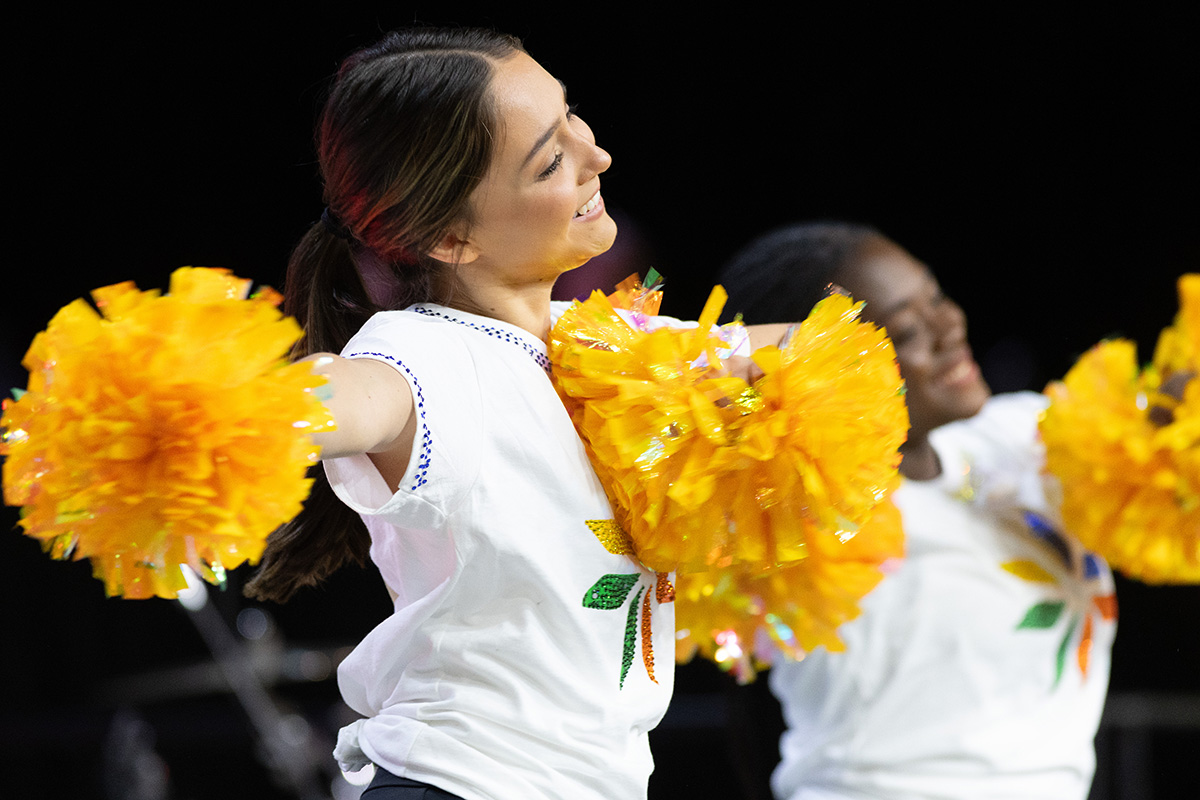
Representatives of United Women in Faith captivated attendees with a dynamic presentation highlighting the organization’s substantial contributions to advocacy and education.
The event began with a striking performance by three dancers from Pfeiffer University, a North Carolina university affiliated with The United Methodist Church. The women wore white T-shirts adorned with the organization’s newly rebranded logo.
Sally Vonner, United Women in Faith’s top executive, detailed the organization’s far-reaching impact: It supports nearly 90 community centers across the U.S. and gives millions to women’s projects around the world. It trains women leaders and transforms through education. It has a new online digital community, a new national membership model, new podcasts and webinars — even a new name.
Vonner issued an invitation to join United Women in Faith’s largest gathering, Assembly, where thousands of women will convene in Indianapolis in May 2026.
“We believe in a bright future, and we believe that love in action can change the world,” she said. “Join us.”
Court says youth required for GC commission
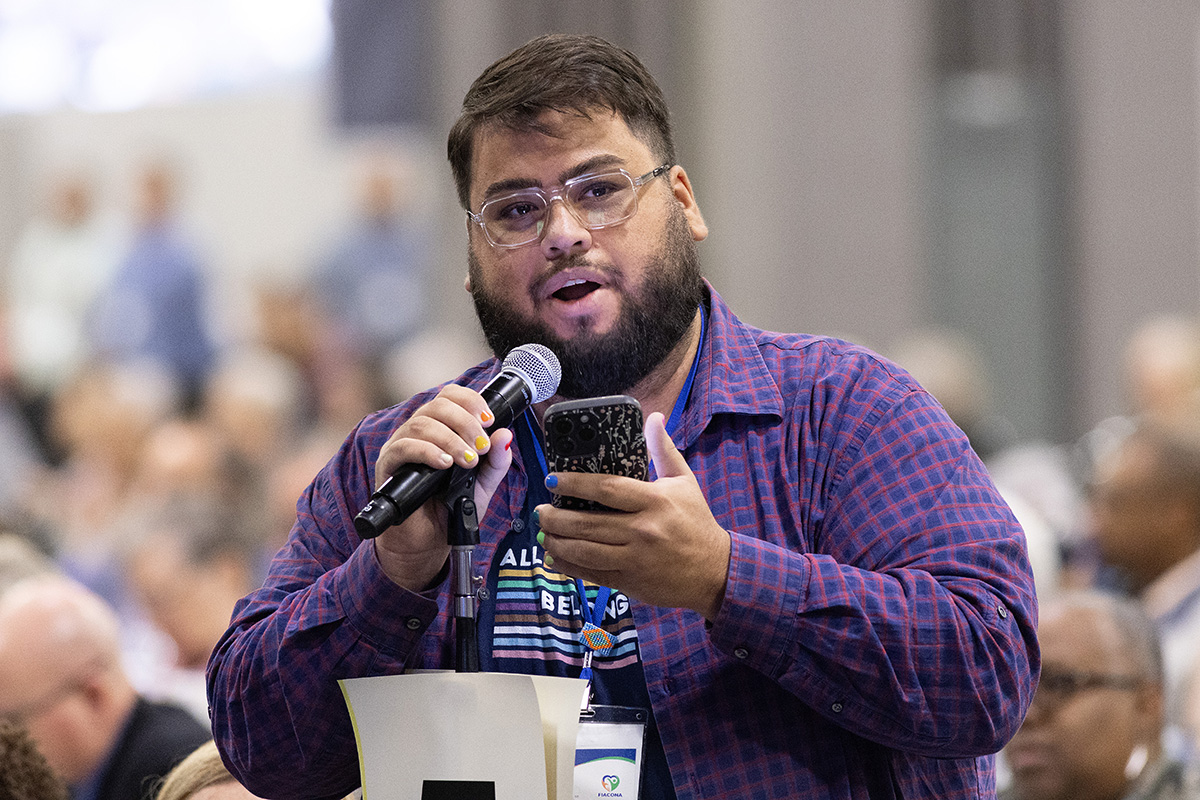
The Judicial Council says General Conference must elect a youth member to the commission that organizes the denomination’s top policymaking assembly.
“If there is no youth representation among the members of the Commission on the General Conference, the General Conference is required to identify, nominate, and elect at least one youth who meets the qualifications set forth,” the denomination’s top court ruled in Decision 1497.
Subscribe to our
e-newsletter
The ruling came in response to a question from Ian Urriola, delegate from the Upper New York Conference. After nominations to the General Conference commission, he asked the Judicial Council for a declaratory decision as to the effect and meaning of Paragraph 511.1 in the Book of Discipline, the denomination’s law book. That paragraph outlines the mandatory makeup of the commission’s membership, which includes one youth.
One of the challenges this General Conference faces is that because of COVID’s disruptions, eight years have elapsed since the last General Conference, meaning youth delegates elected to serve the 2020 General Conference may no longer be youth.
“I’m so glad that the Judicial Council responded so quickly to our request for a declaratory decision about youth representation on the Commission on the General Conference,” Urriola said. “Their analysis suggests to me that it is the responsibility of the delegates to nominate any youth, delegate or not, to serve on the commission, and I know that member delegates of the Division on Ministries with Young People have taken up the holy work of seeking out a youth who will bring much-needed wisdom and perspective to the commission and bring that name to the floor. For far too long, participating in General Conference has been difficult for our youngest United Methodists, and I’m grateful that this decision ensures that there will be a youth serving on the commission moving forward.”
Votes of note
In the April 29 morning session, delegates approved a wide-ranging consent calendar containing more than 100 petitions related to the United Methodist Book of Resolutions. Some petitions included amendments, while others were to simply retain or readopt existing resolutions. Because of the four-year delay of General Conference, the entire Book of Resolutions needs to be readopted, and any resolution not acted upon at this General Conference will expire.
Some of the approved items include several regarding climate change, calls for faithful lending practices and electoral campaign finance reform, the rights of farm workers in the U.S., caring for Native people, opposition to racial profiling and an endorsement of the observance of Children’s Sabbath.
‘There’s an app for that’
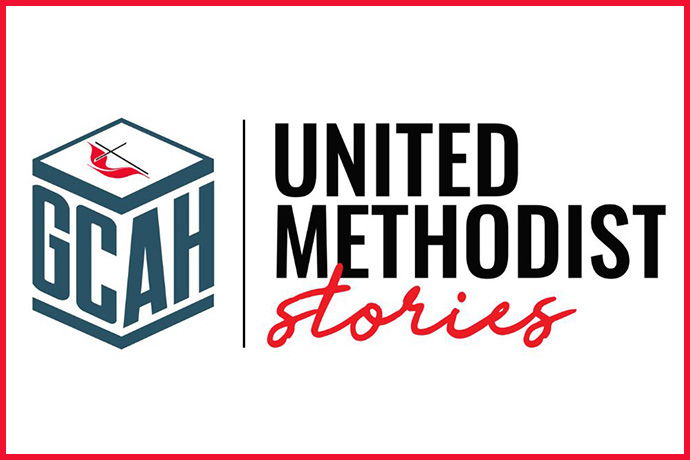
An app to collect stories about United Methodism was introduced during General Conference on April 29.
Developed by the United Methodist Commission on Archives and History, the United Methodist Stories app allows users to record, review and submit their impressions of events such as General Conference. The recordings will be added to the repository of the app, which will eventually be available to all. There will be a 25-year wait before most data will be publicly available, in hopes of encouraging frankness, but users will have the option to make their contributions available immediately.
Ashley Boggan D., top executive of Archives and History, said it will be in the app stores “once we get back from General Conference and make sure that everything worked.”
Week one generates positive vibes
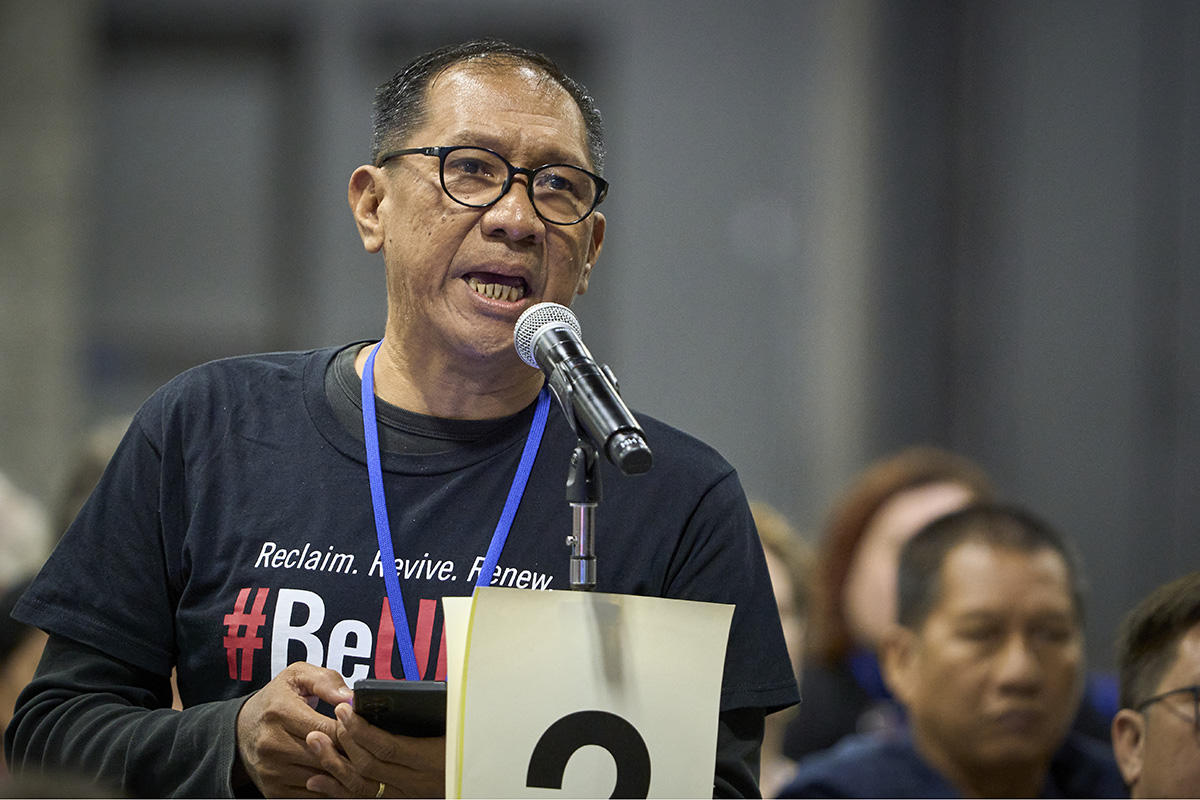
As the action was moving out of committee meetings and into a week of floor debate, participants at General Conference shared a sense of calm optimism about their progress at the halfway point. In a very unscientific survey of delegates by UM News, delegates, pages, observers and other interested folks describe a different, less contentious atmosphere, even in discussions over sexuality — often the topic that leads to the most heated disagreements.
“I feel that we’re going good in this General Conference, that our voices are being heard — the progressives and even me as a traditionalist,” said Lucille Grace Hilario, a lay delegate and director of connectional ministry in the Middle Philippines Conference.
Hilario’s fellow Filipino United Methodists are also calling the April 25 passing of Worldwide Regionalization legislation a “kairos moment.”
Under regionalization, the seven current central conferences and the U.S. would become regional conferences, with the same authority to pass legislation for greater missional impact. Regionalization represents an effort to put the church’s different geographical regions on equal footing — and to make the General Conference less U.S.-centric.
The Rev. Dexter Ceballos, a clergy delegate from the Southern Tagalog Provisional East Conference, said, “This is the start of a new form of connectionalism that will further preserve the culture of each region.”
Butler is a multimedia producer/editor for UM News. Contact him at newsdesk@umcom.org or 615-742-5470. UM News staff; James Lee, director of communications for the Eastern Pennsylvania and Greater New Jersey conferences; and Audrey Stanton-Smith, editor of United Women in Faith’s response magazine, contributed to this report.
To read more United Methodist news, subscribe to the free daily or weekly Digests.
